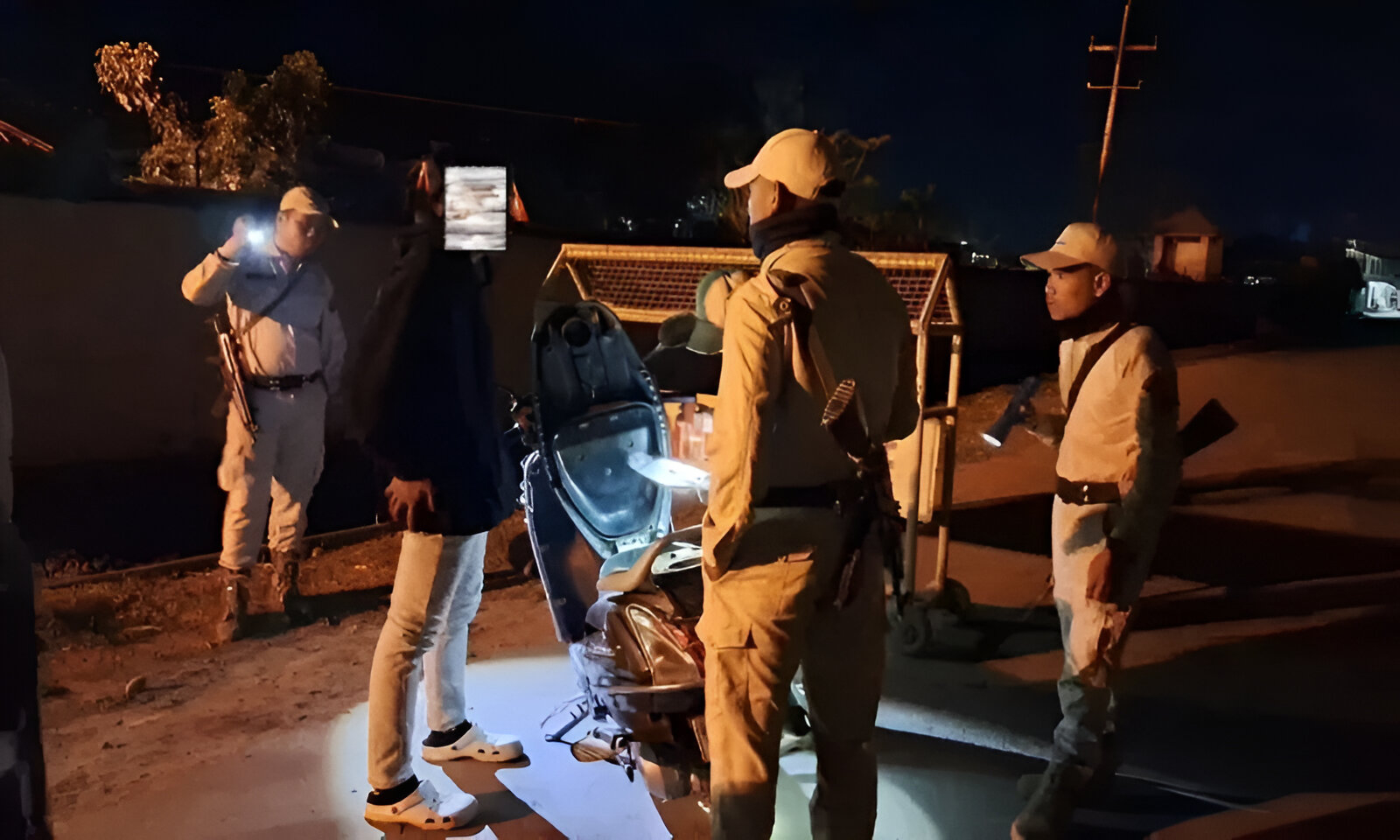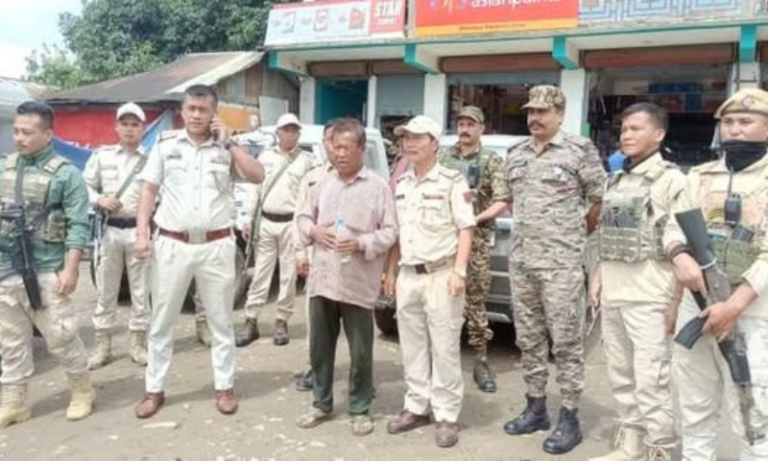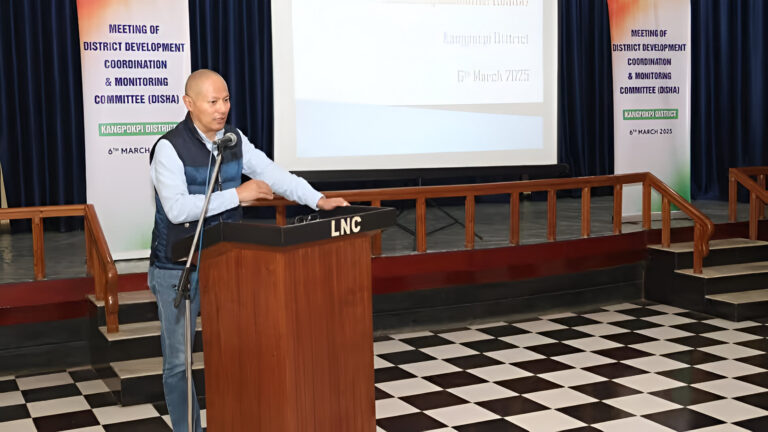Manipur’s Ongoing Struggle Against Insurgency: Recent Arrests and Their Implications
In a series of coordinated operations, Manipur’s security forces have apprehended six insurgents from three different militant groups, seizing weapons and incriminating documents. This development underscores the state’s persistent efforts to combat insurgency and restore peace.
Summary of Recent Events
Over the past 24 hours, joint teams comprising central and state forces conducted operations across Manipur, resulting in the arrest of six militants associated with three insurgent outfits. The operations led to the seizure of arms, ammunition, and incriminating documents.
A Deep Dive into Manipur’s Counter-Insurgency Efforts
Manipur, a picturesque state in Northeast India, has long been a mosaic of diverse cultures and ethnicities. However, beneath its scenic beauty lies a complex web of insurgent activities that have challenged its peace and stability for decades. The recent arrests of six militants across the state shed light on the ongoing counter-insurgency operations and the broader implications for Manipur’s future.
The Anatomy of the Recent Operations
In a concerted effort to clamp down on insurgent activities, joint teams of central and state forces executed a series of operations across Manipur:
- Tengnoupal District: Two activists of the People’s Revolutionary Party of Kangleipak (PREPAK) were apprehended near Border Pillar number 76. The operation yielded three light machine guns and accompanying ammunition, highlighting the group’s potential for orchestrating significant armed confrontations.
- Bishnupur District: An active cadre of the Socialist Revolutionary Party (SOREPA) was arrested in the Kumbi area, with authorities seizing incriminating documents that could provide insights into the group’s internal dynamics and future strategies.
- Additional Operations in Bishnupur: Security forces detained a member of the Kangleipak Communist Party (City Meitei) along with two newly recruited youths. The confiscation of a loaded pistol and a wireless communication set underscores the group’s preparedness and intent to expand its operational capabilities.
Understanding Manipur’s Insurgent Landscape
To fully grasp the significance of these arrests, it’s essential to delve into the intricate tapestry of insurgent groups operating in Manipur:
- People’s Revolutionary Party of Kangleipak (PREPAK): Established in 1977, PREPAK aims to achieve an independent Manipur, free from Indian governance. Over the years, it has been implicated in various violent activities, including bombings and armed assaults, positioning itself as a formidable force in the region.
- Socialist Revolutionary Party (SOREPA): While not as prominent as some of its counterparts, SOREPA has steadily gained traction. Its ideological leanings and operational methods remain subjects of analysis, but its recent activities suggest a growing influence in certain pockets of Manipur.
- Kangleipak Communist Party (KCP): With multiple factions under its umbrella, KCP has been a persistent thorn in the side of security forces. The arrest of members from the ‘City Meitei’ faction indicates internal diversification and possibly differing objectives within the broader organization.
The Ripple Effects of Insurgency on Manipur’s Socio-Economic Fabric
The tentacles of insurgency in Manipur extend beyond mere armed confrontations, permeating various facets of daily life:
- Economic Disruptions: Frequent strikes, extortion rackets, and blockades orchestrated by insurgent groups have stymied economic growth. Businesses operate under a pall of uncertainty, deterring external investments and hampering local entrepreneurship.
- Educational Setbacks: Schools and colleges often find themselves in the crossfire, either as unintended victims or as direct targets. The resultant closures disrupt academic calendars, leading to a generation of students grappling with interrupted education.
- Psychological Toll: The omnipresent threat of violence casts a long shadow over the populace. Communities live in a state of heightened anxiety, with the constant fear of being ensnared in insurgent activities or counter-insurgency operations.
Decoding the Motives Behind Insurgent Activities
Several intertwined factors fuel the insurgency in Manipur:
- Historical Grievances: A sentiment of marginalization and perceived neglect by central authorities has festered over decades, providing fertile ground for insurgent ideologies to take root.
- Ethnic Fragmentation: Manipur’s rich tapestry of ethnic groups, while culturally enriching, has also led to inter-community tensions. Insurgent groups often exploit these fissures to bolster their ranks and justify their actions.
- Economic Disparities: Widespread unemployment and lack of opportunities create a reservoir of disillusioned youth, susceptible to the allure of insurgent narratives promising purpose and financial incentives.
The Dual-Edged Sword of Counter-Insurgency Operations
While the recent arrests signify a tactical victory for security forces, they also bring to the fore the complexities inherent in counter-insurgency measures:
- Intelligence Gathering: The precision of these operations underscores the pivotal role of actionable intelligence. Building trust within communities to source credible information remains a cornerstone of successful interventions.
- Human Rights Considerations: A delicate balance must be maintained to ensure that the zeal to neutralize insurgent threats doesn’t trample upon the rights and freedoms of innocent civilians. Allegations of excesses can erode public trust and inadvertently fuel insurgent propaganda.
- Post-Arrest Rehabilitation: Detaining insurgents addresses the immediate threat, but without robust rehabilitation programs, there’s a risk of recidivism. Integrating former militants into mainstream society, providing them with vocational training and employment opportunities, is crucial for long-term peace.
- Community Reactions and Public Sentiment
In regions where militancy has long been a threat, every successful police operation resonates deeply with the local population. It’s more than just a win for law enforcement—it’s a win for every resident who has lived under the constant threat of violence.
Many locals expressed relief and gratitude towards the police for their swift actions. For residents who have witnessed the disruptive impact of militancy on their daily lives, these arrests bring hope for a safer future. The closure of businesses, the constant fear of attacks, and the uncertainty about the future have been persistent issues, and operations like these offer a glimpse of a more secure tomorrow.
Yet, while the community largely supports these initiatives, there’s also a cautious optimism. People understand that the road to lasting peace is long and winding, and one set of operations, however successful, is just the beginning. The community calls for continued efforts, not just in policing but also in addressing the underlying issues that fuel militancy.
Government and Policy Implications
Beyond the immediate impact on security, the arrest of these rebels has significant policy implications. The government has long been grappling with the challenge of militancy in Manipur, and these operations underline the need for a multi-faceted approach to the issue.
Strengthening Intelligence Networks:
The success of these operations reinforces the importance of robust intelligence networks. Policymakers are now more convinced than ever that investing in both human and technological intelligence is key to preempting militant activities.
Enhanced Coordination Among Agencies:
The operations were a collaborative effort, involving various branches of the police and intelligence agencies. This inter-agency coordination is something that policymakers are keen to strengthen further. It highlights the need for a unified strategy that can be replicated across other conflict-prone regions.
Community Policing Initiatives:
As noted earlier, local communities played a critical role in providing timely intelligence. Recognizing this, there is a growing push to formalize community policing initiatives that foster stronger bonds between law enforcement and the public. Such initiatives can help create a safer environment and build mutual trust.
Addressing Root Causes:
While security operations are essential, they are only part of the solution. There is an increasing acknowledgment among policymakers that addressing the socio-economic and political grievances that fuel militancy is crucial. This means not only cracking down on rebel activities but also investing in development projects, education, and job creation in the affected regions.
Economic Ramifications and the Path to Recovery
It’s important to consider the broader economic impact of such operations. Militancy not only threatens lives but also hampers economic growth. The disruption of trade, closure of local businesses, and the constant state of alert have long-term consequences on the regional economy.
Boosting Local Business Confidence:
When security is restored, it paves the way for economic recovery. Local businesses, which have been on edge due to the persistent threat of violence, can begin to thrive again. With a more stable environment, investment and commerce are likely to see a revival, thereby contributing to the overall economic health of Manipur.
Restoration of Normalcy:
Every time the police crack down on militancy, it is a step toward restoring normalcy. Schools, markets, and public spaces can function without the constant fear of attack, which in turn nurtures a conducive environment for growth and development. The re-establishment of daily life is not only a sign of progress but also a beacon of hope for a future free from the shadows of violence.
Future Economic Policies:
The success of these operations could very well influence future economic policies in the region. With the focus shifting towards development, there is a real opportunity for the government to implement policies that attract investment, create jobs, and promote sustainable growth. Economic recovery and security often go hand in hand, and a safer Manipur can lead to a brighter, more prosperous future for all its residents.
A Glimpse into the Daily Life Post-Operations
Imagine waking up in a community where the tension of yesterday has been replaced by a cautious optimism today. That’s the vision many locals in Manipur are starting to see with the recent police operations. Daily routines, once disrupted by the constant threat of violence, are slowly returning to normal.
Children can go to school without the fear of encountering militants, families can shop at local markets without heightened anxiety, and community events can be organized with a sense of safety. This transformation is not just about the absence of conflict—it’s about the re-emergence of hope and the belief in a better tomorrow.
For many residents, the arrest of these six rebels is a turning point. It symbolizes that their voices matter, and that the state is not indifferent to their struggles. Such moments are crucial in rebuilding trust between the government and the people, reinforcing the idea that together, communities can overcome even the most daunting challenges.
The Road Ahead: Challenges and Opportunities
While the recent operations are undoubtedly a significant step forward, the journey toward lasting peace in Manipur is far from over. Several challenges lie ahead:
Sustaining Momentum:
The police have delivered a strong message with these operations, but maintaining that momentum is critical. Continued vigilance and regular intelligence updates will be essential in preventing the resurgence of militant activities.
Addressing Underlying Grievances:
Militancy in Manipur is fueled by deep-seated socio-economic and political issues. Long-term peace will require not just security operations but also targeted policies to address these grievances. This might include investment in education, healthcare, and infrastructure, as well as efforts to promote political inclusivity.
Regional Cooperation:
Manipur’s challenges are not confined to its borders. They are part of a larger regional issue affecting the Northeast. Collaborative efforts with neighboring states and even central government support will be crucial in developing comprehensive strategies to combat militancy.
Balancing Security and Rights:
While strong security measures are necessary, they must be balanced with respect for human rights and the rule of law. Ensuring that operations do not inadvertently harm innocent civilians is a constant challenge that requires ongoing training and accountability.
Empowering Local Communities:
Finally, empowering the local communities to take an active role in maintaining peace can create a sustainable model for the future. Initiatives that promote community policing, dialogue, and development are key to building resilience against the forces of militancy.
Conclusion
The arrest of six rebels in three well-coordinated operations by the Manipur Police is more than a headline—it’s a significant milestone in the ongoing battle for peace and security in the region. These operations are a clear demonstration of the power of intelligence-led policing, inter-agency coordination, and the crucial role of community support. While the challenges ahead remain formidable, each step forward brings Manipur closer to a future where safety, development, and unity are not just aspirations but realities.
As we reflect on these events, it’s important to remember that the journey toward lasting peace is built on small victories. The courage of the police, the resilience of the local communities, and the commitment of the government all play a vital role in this process. With continued efforts and unwavering determination, a safer and more prosperous Manipur is well within reach.
Frequently Asked Questions (FAQs)
What were the main objectives of the three operations carried out by the Manipur Police?
The operations aimed to dismantle militant networks by arresting key rebel operatives, disrupting their communication channels, and preventing future militant activities through precise intelligence-led raids.
How did the police gather the intelligence necessary for these operations?
The police used a mix of human intelligence from local informants, electronic surveillance, and advanced reconnaissance tools such as drones to monitor rebel movements and plan the operations accurately.
What impact do these arrests have on the overall security situation in Manipur?
The arrests significantly disrupt the operational capabilities of the rebel groups, provide critical strategic information to law enforcement, and serve as a deterrent to other militant factions, thereby enhancing regional security.
How are local communities responding to the recent police operations?
Many local residents have expressed relief and optimism as these operations restore a sense of safety and normalcy. Community cooperation during the operations also highlighted the positive role that local support can play in maintaining security.
What steps are being considered to ensure long-term peace in the region?
In addition to ongoing security measures, there is a focus on addressing socio-economic and political grievances through community engagement, infrastructure development, and inclusive policies that aim to empower local communities and prevent the resurgence of militancy.



